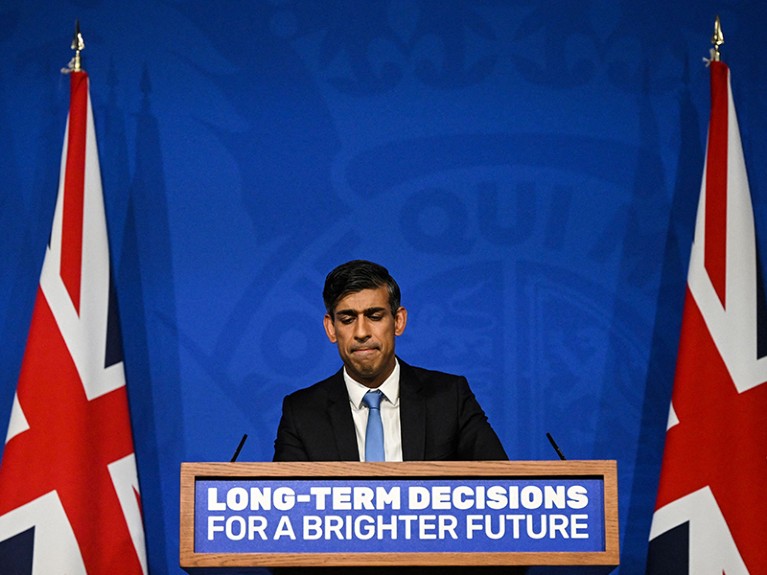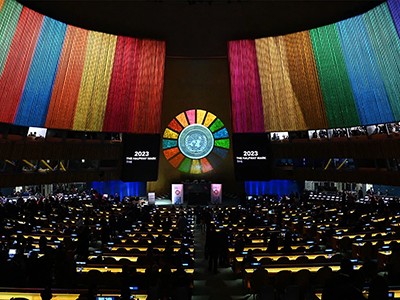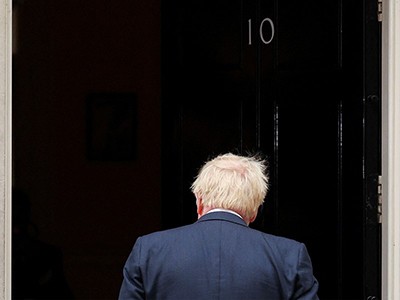
‘I’m confident that we can adopt a more pragmatic, proportionate and realistic approach to meeting Net Zero that eases the burdens on working people,’ said UK Prime Minister Rishi Sunak on 20 September.Credit: Justin Tallis/AFP/Getty
On 20 September, UK Prime Minister Rishi Sunak made a shock announcement that is reverberating around the world. In the week when the world’s scientists and diplomats were recommitting to the United Nations Sustainable Development Goals, he announced that the United Kingdom will delay its decarbonization plans.
A ban on the sales of new petrol and diesel cars will be postponed from 2030 to 2035. A planned 2030 phase-out of new gas-fired boilers for heating homes is to be pushed back by the same amount. Earlier this year, and to widespread criticism, the government announced a new round of exploration licences for oil and gas companies. And a plan to expand capacity for offshore wind energy is on hold.
There has been some welcome news. Sunak reconfirmed on 20 September that the United Kingdom will be contributing £1.62 billion (US$2 billion) to the latest replenishment of the Green Climate Fund for adaptation and mitigation in low- and middle-income countries. More-over, he said, £150 million ($184 million) will be distributed between 50 scientists and engineers to develop “breakthrough green technologies”.
World recommits to 2030 plan to save humanity — despite falling short so far
But the decision to hit the brakes on UK decarbonization is misguided. It isn’t known which scientists or businesses were consulted, and many UK researchers across fields from climate to energy policy, engineering and hydrology, have gone public with their concerns. The over-arching problem, as summarized by Christopher Knibb, director of policy at the Institution of Engineering and Technology in Stevenage, UK, is that Sunak sees the 2030 deadlines as a burden, rather than an opportunity. Many businesses of all sizes are well on the way to transforming their energy sources, supply chains and operations, and are dismayed by this week’s developments. The UK Royal Academy of Engineering has been asked to administer the breakthrough-technologies fund, but its president, Jim McDonald, did not hide his disappointment when he said: “Government will need to provide policy stability that transcends electoral cycles and administrations if business is to plan with confidence and play its full role.”
Leaders are expected to show ambition and vision. The lectern from which Sunak spoke was emblazoned with: “Long-term decisions for a brighter future”. But the evidence is of short-term thinking that risks dividing people and will certainly divide political parties. There are no sunlit uplands in the country’s future, just a gloomier tomorrow.
The core of Sunak’s speech had two arguments: that climate policies are hurting citizens and that it is necessary to go slow to retain public confidence in mitigating environmental change. In a cost-of-living crisis, he argued, people should not be told to buy electric vehicles or change from gas to electric heating. Sunak also said, without citing proof, that slower decarbonization will still allow the country to achieve net-zero emissions by 2050, a target enshrined in UK law. The government’s own expert advisers do not agree.
Liz Truss must value science, not fear it
The speech also displayed a lack of awareness of research on what pumping carbon dioxide into the atmosphere is already doing to the planet and to vulnerable people. It is the poorest people, both in the United Kingdom and globally, who are among the most vulnerable to climate-related weather extremes — because they lack the resources to insulate themselves from economic and other shocks (X. Sheng et al. Environ. Sci. Pollut. Res. 30, 77771–77783; 2023).
Hydrologist Hannah Cloke at the University of Reading, UK, was right when she told the Science Media Centre in London: “The effects of runaway climate change are understood by the whole world, and agreed on by the UK government” through the Inter-governmental Panel on Climate Change.
Sunak’s speech could have been written 30 years ago: it rehearsed decades-old arguments to stop or delay action to protect the environment. These were laid to rest by the 2015 Paris climate agreement and it is simply wrong to reintroduce them now. When Sunak attends this year’s UN climate conference in Dubai, representatives of low- and middle-income countries could legitimately argue that they have a better case than the United Kingdom for slowing down decarbonization, because they have more vulnerable people, with even lower incomes.
Memo to Boris Johnson’s successor: tell the truth, respect evidence and restore trust
Sunak’s announcement sadly also reintroduces politics into climate policy, ending a carefully constructed cross-party, cross-sector, science-based consensus. In 2008, a Labour government put climate commitments into law. This was strengthened by two Conservative governments. Then-prime minister Theresa May decreed in 2019 that the United Kingdom would have net zero emissions by 2050. The following year, her successor, Boris Johnson, oversaw the legislation to phase out new petrol and diesel engines.
There are many things the current government could do now to improve the lives of the poorest people. It could mandate that those with the lowest incomes always pay the lowest energy prices; it could invest on a larger scale in home insulation to keep bills down and reduce carbon footprints. A nationwide education and training programme could give people access to green jobs, especially in the United Kingdom’s many deprived areas.
Carbon budgets and net-zero deadlines are not a game, and the future of our planet is not an issue on which to create divisions. When he came into office, Sunak presented himself as a steady hand. He works within a consensus of research and expertise in economic policy. He has recognized the necessity of restoring UK researchers to their important place as part of the funding system Horizon Europe. He is talking to educators about how to encourage more young people to study mathematics at school. It is just as important to engage with, not ignore, expert advice in climate and energy science and policy. It is not too late to change course.

 World recommits to 2030 plan to save humanity — despite falling short so far
World recommits to 2030 plan to save humanity — despite falling short so far
 Liz Truss must value science, not fear it
Liz Truss must value science, not fear it
 Memo to Boris Johnson’s successor: tell the truth, respect evidence and restore trust
Memo to Boris Johnson’s successor: tell the truth, respect evidence and restore trust



